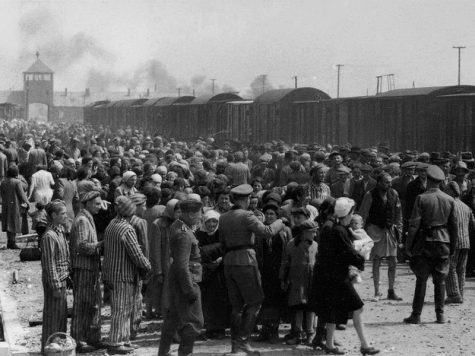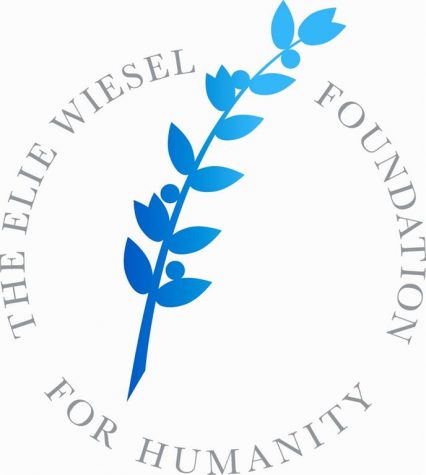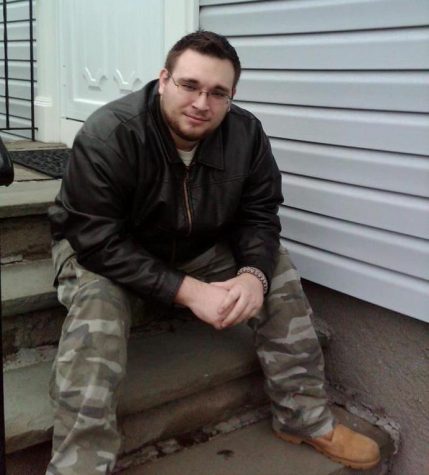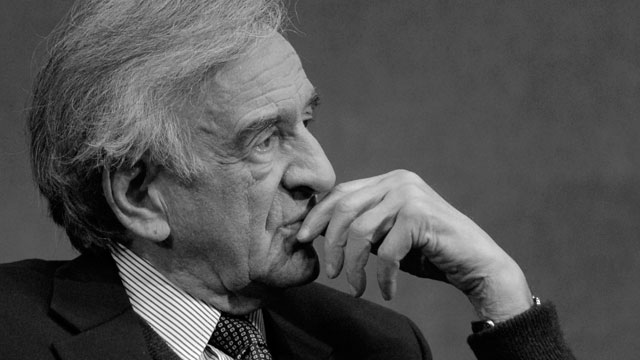Visiting Scholar Lectures Mercy About the Importance of Elie Wiesel’s Work
For David L. Phillips, “Night”, published in English in 1960, was the beginning of Elie Wiesel’s journey as an activist.
Wiesel wrote the incredibly powerful, internationally acclaimed memoir, “Night” (La Nuit) after experiencing the horrors of the Holocaust. “Night” became Wiesel’s lesson to humanity, a dramatic story warning of the depth’s of humanity.
“Elie was initially reluctant to speak about his experience. However, “Night” broke the silence and put Elie on the path to be a global activist against atrocities,” Phillips said.
Phillips was the guest speaker during Mercy College’s latest installment of its Center for Global Engagement Visiting Scholar Lecture Series events, titled “A Conversation with David L. Phillips on Elie Wiesel, Nobel Laureate and Humanitarian Activist.”
Phillips is the Director of the Peace-building and Rights Program of the Institute for the Study of Human Rights at Columbia University and a Mercy College Visiting Scholar. Phillips, who Wiesel was a great inspiration, recalls meeting the activist for the first time.
“Elie was an inspiration. We met at an event for the American-Jewish World Service. I wrote him with thanks and he responded, ‘Thank you for giving voice to the voiceless.’ I framed that letter and keep it with me,” Phillips said.
The Phillips lecture at Mercy was an emotional affair. Phillips discussed the life of Wiesel, who overcame the horrors and inhumanities he witnessed and suffered at the hands of the Nazis to become a name that is at the forefront of people’s minds when they think of humanitarian causes and peacebuilding activism.
Wiesel was born in Sighet, Transylvania, in 1928, now modern-day Romania. Sighet fell under Hungarian rule during World War II. The first instance of Jewish deportation in the Romanian village occurred in 1942. The second occurred shortly after Passover in 1944. Just 15 years old, Wiesel and his family were among those deported.
Wiesel, along with his father, mother, younger sister, and two older sisters were transported to the infamous concentration camp Auschwitz in German-occupied Poland. Auschwitz, the largest of the Nazi death camps, became a focal point of the Nazi Final Solution. Around 1.3 million people are estimated to have been transported to the camp and 1.1 million perished there in its gas chambers.
Of the 1.3 million who had been transported to the camp, an estimated ninety percent were Jewish. Among them were Soviet prisoners of war, Poles, Romani, Jehovah’s Witnesses’, gays and lesbians, and the mental and physically disabled. Auschwitz was also the site of experiments conducted by the notorious Dr. Josef Mengele. Wiesel’s mother and younger sister perished in the camp.

As Soviet forces began to push deep into Nazi territory and the Nazis were heading for defeat, Auschwitz was ordered abandoned. Wiesel and his father were transported to Buchenwald near Weimar, Germany.
Auschwitz was liberated on Jan. 27, 1945, by the Soviet army. They discovered around 7,000 prisoners that lay sick and dying, along with the emaciated skeletal remains of victims the Nazis had left before they fled.
Wiesel and his father were transported to Buchenwald, shortly before the liberation of the camp. On April 11, 1945, detachments from the US 6th Armored Division liberated the camp after the inmates had taken control and the Nazi occupying force had fled. Just eleven days later, on April 30, 1945, with Soviet forces, a mere several blocks from the Reich Chancellery, the very symbol of the Nazi regime, Adolf Hitler and his wife Eva Braun committed suicide within the depths of the Fuhrerbunker.
Following the conclusion of the war, Wiesel traveled to Paris, where he studied and became a journalist. It was during this time that Wiesel encountered the famed French writer Francois Mauriac. Mauriac was a member of the Académie Francaise, the pre-eminent body for the French language, a Laureate of the Nobel Prize in Literature and was awarded the Legion d’honneur in 1958. Mauriac convinced Wiesel to recount his experiences in Auschwitz through a written work.
Silence. A simple noun, Wiesel’s masterful work added a layer of emotional and philosophical baggage to the word that is incalculable. Silence was both a structural element, in which Wiesel saw it as an obstacle to truly convey the gravity of the reality behind the words he chose and a theme that saddled humanity with a choice.

“I swore never to be silent whenever and wherever human beings endure suffering and humiliation. We must always take sides. Neutrality helps the oppressor, never the victim. Silence encourages the tormentor, never the tormented,” Wiesel said.
Silence described the silence of humanity during the Holocaust. How could an event of such depraved inhumanity take place? It was the silence of the victims of the Holocaust, culture, religion, song, family, and faith wiped out in an instant. And the silence of God, the silence that troubled Wiesel the most. It was God’s silence that forced Wiesel to come to terms with his spirituality.
Some have believed that it was Wiesel being naive. For Phillips, he doesn’t believe that to be true. “He was not naive. Elie questioned how a merciful God could allow such suffering,” Phillips said.
For Wiesel, the horror’s he witnessed could never truly be encapsulated in words with the same sharpness as silence. It was this reason that Wiesel rejected famed filmmaker Orson Welles when he approached Wiesel in hopes of adapting “Night” into a film. Wiesel believed that film could not tell the story.
“Elie refused to be silent in the face of terrible atrocities. He believed that silence implied complicity with the crime,” Phillips recounts of Wiesel’s dedication.
Wiesel wasn’t just an eloquent wordsmith, he was a man of conviction. Wiesel became a celebrated activist, volunteering his time and effort for anyone who couldn’t afford the sound of “silence” from humanity. Wiesel was present in the Soviet Union during the mid-1960s to aid and document the struggles of Soviet Jews. His book “The Jews of Silence” (1966) arose from his experiences. Wiesel was a staunch supporter of the rights of the Kurds, an indigenous people of the Mesopotamian plains and highlands now within the territories of Turkey, Iran, Iraq, and Syria. He visited the refugee camps of Cambodia, defied Apartheid in South Africa, and raised his voice in opposition to ethnic cleansing in the former Yugoslavia, what had then become the Bosnian war. Wiesel also aided the Miskito Indians of Nicaragua during the Miskito-Sandinista conflict, and for the Desaparecidos of Argentina.
 Wiesel was appointed as the Chairman of the President’s Commission on the Holocaust by then United States President Jimmy Carter. Wiesel also became the founding chairman of the United States Holocaust Memorial Council in 1980. During his time upon the council, he championed the efforts in the creation of the United States Holocaust Memorial Museum, which is located in Washington D.C.
Wiesel was appointed as the Chairman of the President’s Commission on the Holocaust by then United States President Jimmy Carter. Wiesel also became the founding chairman of the United States Holocaust Memorial Council in 1980. During his time upon the council, he championed the efforts in the creation of the United States Holocaust Memorial Museum, which is located in Washington D.C.
Wiesel was not merely a celebrated author and activist, he was also an educator. For what would investing time and effort into making the world a better place if the same lessons he was teaching weren’t instilled into youth that would someday lead our society. Wiesel served as the Andrew W. Mellon Professor in the Humanities at Boston University. He also held the title of University Professor along with serving as a member of the Faculty in the Department of Religion and in the Department of Philosophy. Wiesel served as Distinguished Professor of Judaic Studies at the City University of New York and was the first Henry Luce Visiting Scholar in Humanities and Social Thought at Yale University, where he served from 1982-1983.
Wiesel’s accomplishments earned him awards that put him in a pantheon that few could, or have ever ascended to. Among his most distinguished awards were his Presidential Medal of Freedom, awarded by President George H.W. Bush on December 11, 1992, and the Nobel Prize for Peace in 1986. Following his Nobel Prize, Wiesel and his wife Marion established the Elie Wiesel Foundation for Humanity. The foundation is centered on eliminating indifference, intolerance, and hate through dialogue and youth-related programs that develop bonds of acceptance, tolerance, and equality.
Wiesel was a soul who experienced the depravity of humanity, but rather than lose his spirit, he developed a spiritual identity greater than we could ever achieve. He was a writer, an activist, a teacher; yet has and will forever be remembered as a survivor.
Phillips feels that Wiesel’s legacy is one of hope. “Every person can make a difference as an individual and through collective action. Hold governments and leaders accountable to a high moral standard. Especially today, when there is a vacuum of moral leadership in the U.S. and around the world, we must redouble our efforts. Saving one life can enable thousands more lives to be saved,” said Phillips.
Elie Wiesel experienced silence, yet Elie Wiesel was anything but silent in the face of atrocities.

Michael Dunnings, otherwise known by the Hungarian equivalent "Miska", is a native of Dobbs Ferry and a senior studying Journalism at Mercy College. Michael...








